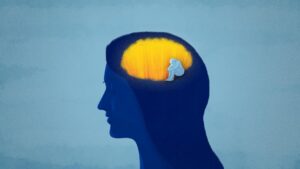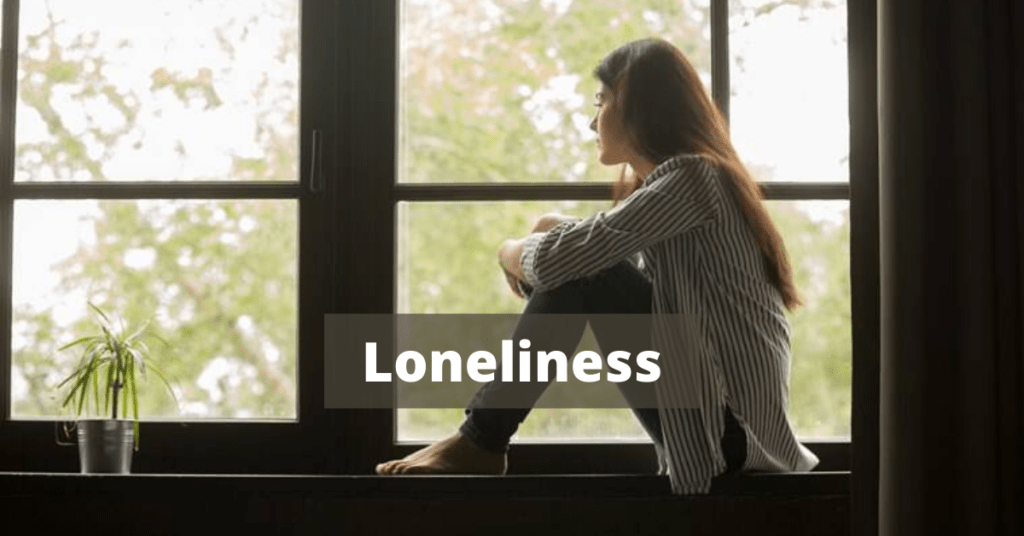Loneliness can take a toll on our emotional well-being as we start to experience symptoms such as depressive symptoms, anxiety, and anger. It’s important to know how to deal with feelings of loneliness and what you could do to prevent it from happening again in the future.
Contents
What Is Loneliness?

Loneliness is the feeling of being alone, isolated, or distant from people because you don’t have any meaningful relationships in your life. Loneliness can be temporary or long term and some causes of loneliness are good (learning to spend time on your own), while some causes are not as positive (loss of a loved one). The more you feel lonely or isolated from others, the risk for mental health problems also increases such as depression and anxiety.
Signs of Loneliness
There are two main types of loneliness: social and emotional. Social loneliness can be a result of a lack of connection with others, while emotional loneliness is the feeling that you don’t have any meaningful relationships in your life. It’s important to note that these two types of loneliness aren’t mutually exclusive as you can feel both social and emotional loneliness. Loneliness can take a toll on our emotional well-being as we start to experience symptoms such as depressive symptoms, anxiety, and anger. It’s important to know how to deal with feelings of loneliness and what you could do to prevent it from happening again in the future.
Some general signs that someone may be experiencing feelings of loneliness are:

- Having a lack of interest in things you used to enjoy
- Not enjoying your time alone
- Constantly checking your phone for messages or updates
- Neglecting yourself (not eating properly, not exercising, etc.)
Effects Of Loneliness On Health
Loneliness can have a significant impact on our health. According to a study by Brigham Young University, loneliness can increase the risk of early death by up to 26%. Loneliness can also increase our risk of developing cardiovascular disease, arthritis, and depression.
It can affect our health in a number of ways. Loneliness can lead to stress, which can have a negative impact on our physical health. It can also lead to negative thinking, which can increase our risk of developing depression.
Loneliness is a feeling of isolation and emptiness that can affect us negatively both mentally and physically. It can lead to stress, which in turn can lead to a number of physical health problems. Loneliness can also lead to negative thinking, which can increase our risk of developing depression. There are a number of things we can do to reduce loneliness, including reaching out to others, joining a club or group, participating in social activities, and connecting with others online. We can also talk to our doctor about our feelings of loneliness. Our doctor may be able to recommend resources or therapies that can help reduce our loneliness.
Pain experienced when we are alone
 When we feel lonely it can also lead to us experiencing physical pain. This is because physical contact is a very important part of human connection. When we don’t have any physical connections it can cause us stress and anxiety. That in turn increases our risk of developing heart disease and depression. As well as this being around other people makes us happier. So when we are all on our own for too long loneliness creeps in making things worse leading to self-medication.
When we feel lonely it can also lead to us experiencing physical pain. This is because physical contact is a very important part of human connection. When we don’t have any physical connections it can cause us stress and anxiety. That in turn increases our risk of developing heart disease and depression. As well as this being around other people makes us happier. So when we are all on our own for too long loneliness creeps in making things worse leading to self-medication.
The best way to combat this is socializing. Finding mutual friends with similar interests who are happy spending time together can help alleviate the stress and anxiety of being on your own. Turning down TVs, mobile phones, tablets, etc. for a while also helps us bond more in person. Rather than through electronics so we can get out there meet people, and make new friends.
How To Overcome Feelings Of Loneliness?
There are some effective ways you can overcome and cope with feelings of loneliness: How to deal with feelings of loneliness? It’s important to know how to deal with feelings of loneliness. Although it’s normal for everyone to feel lonely at times, especially when going through a hard time in life, you should not let yourself get stuck in these negative thoughts and emotions. Loneliness can lead to a variety of mental health problems including depression and anxiety.
You can take care of your emotional well-being by doing the following:
1. Set personal goals for yourself
 Loneliness can make it difficult to motivate yourself but setting realistic goals for yourself is a great way to keep focused on doing positive things in life. These goals don’t have to be drastic changes in your life, they just need to be things that make you feel good when you achieve them.
Loneliness can make it difficult to motivate yourself but setting realistic goals for yourself is a great way to keep focused on doing positive things in life. These goals don’t have to be drastic changes in your life, they just need to be things that make you feel good when you achieve them.
If necessary, make yourself more socially active by joining clubs or groups, taking classes, going to sporting events, participating in activities outside of work, and reaching out to others online. Don’t be afraid to reach out for help if you find that you are struggling too much with feelings of loneliness!
2. Reach out to your friends and family
This can be a difficult thing to do if you’re feeling lonely, but it’s important to remember that your loved ones want to help and support you. Talk to them about how you’re feeling and let them know what they can do to help make you feel better.
Spend more time in social situations whether it’s having dinner parties at your house, hanging out with friends, or attending social events, do what you can to spend time around other people.
 This is a great way to meet new people who share your interests. It can be intimidating at first, but don’t be afraid to take the plunge and join a group that looks interesting to you.
This is a great way to meet new people who share your interests. It can be intimidating at first, but don’t be afraid to take the plunge and join a group that looks interesting to you.
Join a support group or become involved with an online forum where you can interact with others going through similar experiences. This provides not only social support but also information about various coping strategies and resources which might be useful for your particular situation.
4. Have at least one close friend
Make an effort to develop a closer relationship with at least one other person. This could be someone you already know (e.g., a friend or family member) or getting to know somebody new – perhaps someone who is also facing similar challenges with chronic illness/recent diagnosis. You might even consider trying some online dating!
5. Seek professional help if needed
If loneliness is causing negative effects on your life or if you find that you’re unable to find ways to cope with it on your own, then talking with a therapist or counselor is a great idea. They can offer more insight into why you feel the way you do and help you create coping mechanisms to help overcome these feelings on your own.
Preventing Loneliness In The Future

If you recently experienced some type of change (i.e., moving to a new city or losing someone close to you), then it’s likely that loneliness was triggered by this change. If this is the case, make sure that when things start returning back to normal in your life (i.e., finding a new friend group, reconnecting with old friends) that still make an effort not to let yourself become isolated again. It’s also important to keep in mind that loneliness can come and go, so don’t be discouraged if you experience it every once in a while. Just make sure that you have healthy coping mechanisms in place to deal with those feelings when they do come up.
- Reach out to friends or family members who understand what you’re going through and who try their best to comfort you during this difficult time
- Try joining social groups such as clubs where there is an increased chance you’ll meet new people
- Volunteer for organizations that help improve your neighborhood (i.e., homeless shelters)
- Spend time on your own in activities that make you happy and fulfilled such as reading, writing, listening to music, or spending time outdoors Preventing loneliness in the future
- Talking openly about how you’re feeling with someone you trust so that they understand what you’re going through and can provide emotional support.
Difference between Being Alone And Feeling Lonely
There is a big difference between being alone and feeling lonely. Being alone simply means that we are by ourselves. Feeling lonely, on the other hand, means that we are not happy with being alone and we feel a sense of emptiness or isolation.
There are a number of reasons why we might feel lonely. We might feel lonely because we don’t have many friends or because we don’t have any close relationships. We might also feel lonely because we are not involved in any activities or groups that we enjoy. Alternatively, we might feel lonely because we spend most of our time online and don’t have many face-to-face interactions.
There are a number of things we can do to reduce our feelings of loneliness. We can spend more time in social situations and develop a closer relationship with at least one other person. We can also take steps to make ourselves more socially active. By joining clubs or groups, taking classes, going to sporting events, participating in activities outside of work, and reaching out to others online.
Why Do You Prefer Being Alone?
There are many signs that can indicate if you’re feeling lonely including:

- You have a hard time making friends because people don’t seem to understand you or click with you very well
- You avoid going out with friends because socializing drains your energy and makes you anxious
- Your feelings of loneliness seem to increase during certain times of the year (i.e., Christmas break)
- You tend to spend long periods of time alone whether it’s at home or in public places where nobody really talks to each other
Loneliness is a common problem for those who suffer from chronic illness or those who have been recently diagnosed. Not only does this make them feel sad and alone. But it can also affect their physical health as well as their mental health.
Why Staying Connected To Others Is Necessary?
Being disconnected from other people makes us unhappy. While spending time alone increases our risk of developing depression and various health problems including heart disease. For some reason when we are all alone feelings of loneliness creep in making things worse this leads to self-medication.
The best way to fight this is to turn down technology such as TVs, mobile phones, etc. for a while. And focus more on the physical connections with others rather than through electronic devices. This helps us bond more in person rather than through electronics. So we can get out there meet people and make new friends.
Research shows that being alone doesn’t have to lead to feeling lonely. In fact, if we are actively engaging in activities. Then our chances of experiencing loneliness decrease significantly. Similarly, even just a little bit of socializing goes a long way towards reducing feelings of loneliness too. So try not to spend too much time on your own. It’s important for your health and well-being that you spend time with other people.
Conclusion
Loneliness is a serious problem that can have devastating effects on an individual’s mental and physical health. The causes of loneliness are diverse, but the symptoms are universal across cultures. If you or someone you know suffers from chronic feelings of isolation. It may be time to reach out for help. Counseling or therapy can provide relief for those who feel alone in their thoughts and struggles by providing them with the support they need to overcome these feelings. So they can learn how to thrive again without being lonely. There are also many opportunities available online through social media platforms. For example, Facebook where people can find communities that share similar interests as themselves. Where they don’t have to worry about feeling excluded because they’re not part of this group.
If you are looking for affordable Online Counseling MantraCare can help: Book a trial therapy session


